
.png)

.png)
.png)


-
.png) 0086-757-85407388
0086-757-85407388 -

-
 terrychen@wintoly.com
terrychen@wintoly.com


.png)

.png)
.png)


.png)



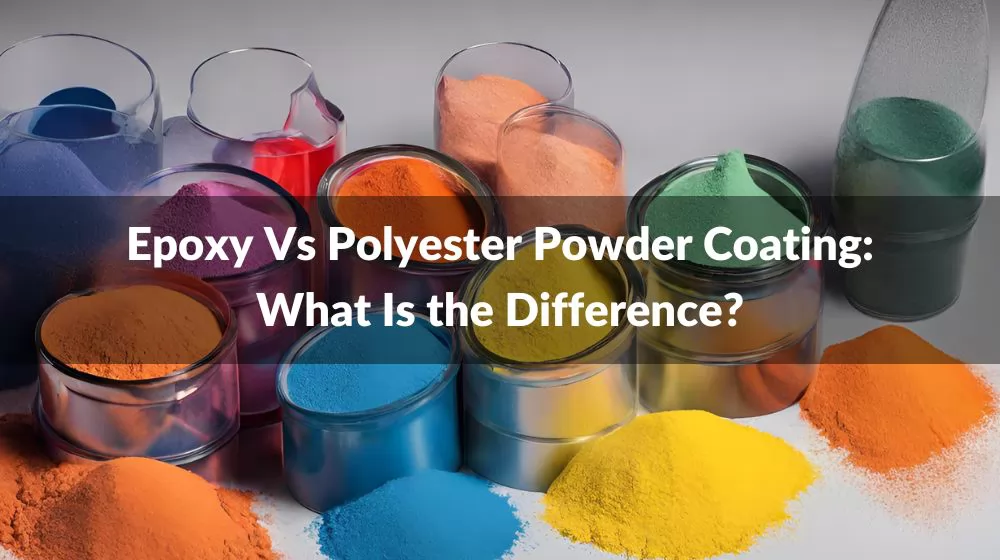
Table of contents:
In the realm of protective coatings, the choice between epoxy and polyester powder coating plays a pivotal role in determining the performance, durability, and aesthetics of finished products. Each type brings its unique set of characteristics to the table, catering to distinct industrial and design needs. Understanding the differences between epoxy and polyester coatings is essential for making informed decisions in various applications, from heavy-duty industrial machinery to architectural structures and consumer goods.
Epoxy and polyester powder coatings are distinct processes used for protective and decorative finishes. Epoxy powder coating involves applying a thermosetting epoxy resin in powder form through electrostatic application, followed by curing to create a durable finish known for adhesion and chemical resistance. Conversely, polyester powder coating uses a thermosetting polyester resin, also applied electrostatically, with curing producing a robust finish known for UV resistance and color retention.
Differences:
The primary differences lie in their chemical composition, with epoxy coatings using epoxy resins and polyester coatings using polyester resins. Epoxy coatings excel in adhesion and chemical resistance, making them ideal for industrial settings. Polyester coatings are valued for UV resistance and color retention, making them popular in outdoor and architectural applications. The choice depends on specific application requirements, with epoxy favored for chemical exposure and polyester for UV resistance.
Understanding these differences sets the stage for a detailed comparison of epoxy and polyester powder coatings.
Coatings play a pivotal role in various industries, providing a protective and functional layer that enhances the durability and performance of materials and products. The significance of coatings can be observed across diverse sectors for the following key reasons:
1. Corrosion Protection:
Coatings, such as epoxy and polyester powder coatings, act as a barrier against corrosion, safeguarding metal surfaces from degradation caused by exposure to environmental elements, chemicals, and moisture. This is particularly critical in industries like construction, marine, and automotive, where metal components are susceptible to corrosion over time.
2. Aesthetic Enhancement:
Beyond protection, coatings contribute to the aesthetic appeal of products and structures. In industries such as architecture, automotive design, and consumer goods manufacturing, coatings provide a visually pleasing finish, allowing for customization and branding while maintaining a high level of durability.
3. Increased Longevity:
Coatings significantly extend the lifespan of materials and equipment by offering resistance to wear and tear. This is particularly vital in sectors like infrastructure, where bridges, pipelines, and other structures require protection against the effects of weathering and mechanical stress to ensure long-term functionality.
4. Chemical Resistance:
Industries dealing with chemicals or aggressive substances, such as petrochemical, pharmaceutical, and manufacturing, benefit from coatings that offer chemical resistance. Epoxy coatings, for instance, are known for their ability to withstand exposure to various chemicals, providing a protective shield for equipment and structures.
5. UV Protection:
In outdoor applications, where exposure to ultraviolet (UV) radiation is a concern, coatings play a crucial role in preventing degradation and fading. Polyester powder coatings, with their exceptional UV resistance, find extensive use in industries like outdoor furniture manufacturing, architectural design, and signage.
6. Regulatory Compliance:
Coatings contribute to compliance with environmental and safety regulations. Low-VOC (volatile organic compound) coatings, for instance, are increasingly utilized in industries where minimizing environmental impact is a priority, aligning with stringent regulatory requirements.
7. Maintenance Cost Reduction:
Coated surfaces require less maintenance, reducing overall operational costs. Industries such as aviation, where maintenance is both costly and time-consuming, benefit from coatings that provide a protective layer, minimizing the need for frequent repairs and replacements.
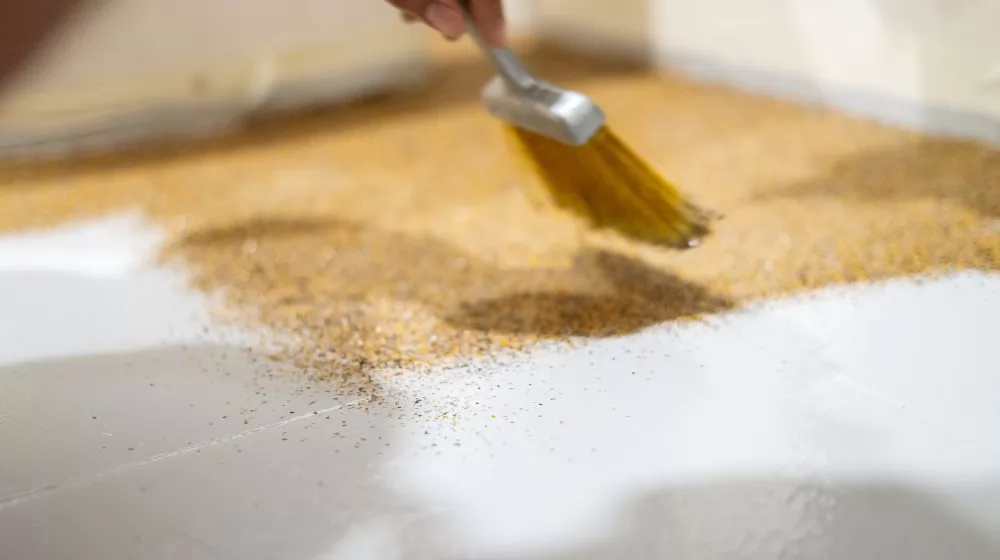
Epoxy powder coating is a surface finishing process that involves the application of a dry, thermosetting epoxy resin in powder form to a substrate. This coating method is widely used to provide durable and protective finishes to various materials, ranging from metals to plastics. The process is known for its ability to create a seamless, high-performance coating with excellent adhesion and resistance to chemicals and corrosion.
The composition of epoxy powder coatings typically consists of the following key elements:
The primary component is the epoxy resin, a thermosetting polymer derived from epoxide monomers. Epoxy resins are chosen for their exceptional adhesion properties and chemical resistance. These resins undergo a curing process during application, resulting in a hard, durable finish.
Curing agents or hardeners are added to the epoxy powder formulation to initiate the cross-linking reaction with the epoxy resin. This reaction is crucial for the curing process, transforming the powder into a solid, protective coating.
Pigments are included in the formulation to provide color to the coating, offering not only aesthetic appeal but also UV stability. Additionally, various additives may be incorporated to enhance specific properties, such as flow, leveling, or texture.
Fillers, such as talc or calcium carbonate, may be added to the formulation to modify the physical properties of the coating, including hardness and impact resistance. Fillers also contribute to the overall performance of the coating.
The application of epoxy powder coating involves an electrostatic spray deposition process. The substrate is electrostatically charged, and the dry epoxy powder is sprayed onto the surface. The charged powder particles adhere to the grounded substrate, forming a uniform coating. The coated object is then cured in an oven, typically at elevated temperatures, where the epoxy resin undergoes polymerization and cross-linking, transforming the powder into a continuous, protective film.
Adhesion: Epoxy powder coatings exhibit strong adhesion to various substrates, ensuring long-lasting performance.
Chemical Resistance: The cured epoxy coating is resistant to a wide range of chemicals, making it suitable for applications in corrosive environments.
Durability: Epoxy coatings provide a durable and hard finish, capable of withstanding mechanical stress and environmental factors.
Versatility: The versatility of epoxy powder coatings extends to different substrates, making them applicable in industries ranging from automotive to electronics.
Epoxy powder coating is renowned for its distinctive set of characteristics that make it a popular choice in various industries. Understanding these key features provides insights into the advantages and applications of this coating method:
Exceptional Adhesion:
Epoxy powder coatings exhibit outstanding adhesion properties. The electrostatic application process ensures that the powder adheres uniformly to the substrate, creating a strong bond. This adhesion is particularly crucial for applications where the coated surface may face mechanical stress or varying environmental conditions.
Chemical Resistance:
One of the standout characteristics of epoxy powder coatings is their remarkable resistance to a wide range of chemicals. This makes them well-suited for use in environments where exposure to corrosive substances is a concern, such as in chemical processing plants, laboratories, or industrial facilities.
Corrosion Protection:
Epoxy coatings provide robust protection against corrosion. The cured coating acts as a barrier, shielding the underlying substrate, typically metals, from the corrosive effects of moisture, chemicals, and atmospheric conditions. This characteristic is valuable in applications where preventing rust or corrosion is critical.
Durability and Toughness:
Known for their durability, epoxy powder coatings create a tough and resilient surface. This toughness makes them resistant to scratches, abrasion, and impact, ensuring a long-lasting and aesthetically pleasing finish. Consequently, epoxy coatings are often chosen for applications requiring durable and wear-resistant surfaces.
Versatility in Application:
Epoxy powder coatings are versatile and can be applied to a diverse range of substrates, including metals, plastics, and composites. This adaptability makes them suitable for various industries, from automotive and appliances to electronics and infrastructure.
High Temperature Resistance:
The cured film of epoxy coatings can withstand relatively high temperatures. This characteristic is advantageous in applications where exposure to heat or thermal fluctuations is expected, ensuring the coating maintains its integrity and performance.
Ease of Application:
The electrostatic spray application method simplifies the coating process. The dry powder adheres efficiently to the charged substrate, leading to a uniform and smooth finish. This ease of application contributes to cost-effectiveness and efficiency in industrial settings.
Color Stability and Aesthetics:
Epoxy powder coatings offer excellent color stability, retaining their vibrancy over time. This, combined with the ability to achieve a smooth and even finish, makes them suitable for applications where aesthetics are a priority, such as in architectural design and consumer goods manufacturing.
Understanding these characteristics underscores the versatility and reliability of epoxy powder coatings, making them a preferred choice for applications that demand a balance of protection, durability, and aesthetic appeal.
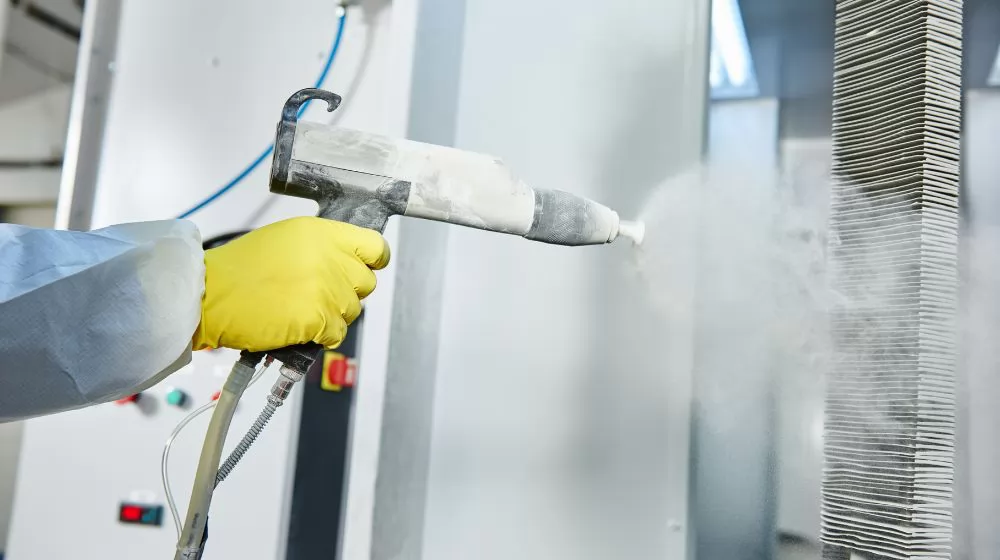
Automotive Industry:
Epoxy powder coatings are applied to automotive components, including chassis, wheels, and engine parts. The coating's durability and resistance to chemicals and corrosion make it ideal for protecting metal surfaces in the challenging automotive environment.
Electronics and Electrical Components:
In the electronics industry, epoxy powder coatings are utilized to protect metal and plastic parts of electronic devices. The coating provides insulation, corrosion resistance, and an additional layer of durability, enhancing the longevity of electronic components.
Architectural and Construction:
Architectural structures, such as metal fences, window frames, and façades, benefit from epoxy powder coatings for their corrosion resistance and aesthetic appeal. The coatings are applied on-site or in manufacturing facilities to protect and enhance the visual appeal of architectural elements.
Metal Furniture and Appliances:
Epoxy coatings are commonly used in the manufacturing of metal furniture, appliances, and fixtures. The coating enhances the appearance of these items while providing a durable and protective layer, ensuring resistance to scratches, corrosion, and everyday wear.
Industrial Equipment:
Various industrial equipment, including machinery, pipes, and tanks, are coated with epoxy powder for corrosion protection. The chemical resistance of epoxy coatings is particularly valuable in environments where exposure to corrosive substances is prevalent.
Oil and Gas Industry:
Epoxy powder coatings are applied to pipelines, valves, and other equipment in the oil and gas sector to protect against corrosion caused by harsh environmental conditions and exposure to chemicals. The coatings contribute to the longevity and integrity of critical infrastructure in this industry.
Aerospace Components:
Aerospace applications utilize epoxy powder coatings for components such as aircraft parts, landing gear, and structural elements. The coatings offer protection against the demanding conditions encountered in aviation, including high altitudes, temperature variations, and atmospheric exposure.
Medical Equipment:
Certain medical equipment, especially metal components, benefit from epoxy powder coatings. The coatings provide a sanitary and corrosion-resistant surface, meeting the stringent requirements of the healthcare industry.
Sports and Recreation Equipment:
Items such as bicycles, sports equipment, and outdoor furniture often undergo epoxy powder coating to ensure they can withstand the elements, resist corrosion, and maintain their appearance over time.
Appliance Manufacturing:
Home appliances, such as washing machines, refrigerators, and ovens, frequently feature epoxy powder coatings. The coatings not only protect the appliances from corrosion but also contribute to their visual appeal in residential settings.
Definition:
Polyester powder coating is a dry finishing process that involves the application of a thermosetting polyester resin in powder form onto a substrate. This coating method is widely employed to provide protective and decorative finishes to a variety of materials, including metals, plastics, and composites. The process results in a durable, aesthetically pleasing coating that exhibits excellent color retention and resistance to environmental elements.
Composition:
The composition of polyester powder coatings typically includes several key components:
Polyester Resin:
The primary component is the thermosetting polyester resin, derived from polyester polymers. These resins contribute to the coating's durability, flexibility, and resistance to UV radiation. The powder form allows for easy and uniform application.
Curing Agents:
Curing agents, also known as hardeners, are incorporated into the formulation to initiate the cross-linking reaction with the polyester resin. This reaction occurs during the curing process, transforming the powder into a solid and resilient coating.
Pigments and Additives:
Pigments are added to provide color to the coating, allowing for a wide range of customization. Additionally, various additives may be included to enhance specific properties, such as UV stability, flow, and texture.
Fillers:
Fillers, such as talc or calcium carbonate, may be present in the formulation to modify the physical properties of the coating, including hardness and impact resistance. Fillers contribute to the overall performance of the coating.
Application Process:
Polyester powder coating is applied using an electrostatic spray deposition process. The substrate is charged electrostatically, and the dry polyester powder is sprayed onto the surface. The charged powder particles adhere to the grounded substrate, forming a uniform coating. The coated object is then cured in an oven, where the polyester resin undergoes polymerization and cross-linking, resulting in a durable and attractive finish.
Key Characteristics:
UV Resistance: Polyester powder coatings are known for their exceptional resistance to ultraviolet (UV) radiation, making them suitable for outdoor applications where exposure to sunlight is a concern.
Color Retention: These coatings exhibit excellent color retention over time, maintaining their vibrancy even in challenging environmental conditions.
Flexibility: Polyester coatings are flexible, allowing for a degree of elongation and deformation without cracking, which is advantageous in applications where the substrate may experience movement or expansion.
Scratch and Impact Resistance: The cured film of polyester coatings provides resistance to scratches and impacts, contributing to the overall durability of the coating.
Smooth Finish: Polyester powder coatings can achieve a smooth and even finish, enhancing the aesthetic appeal of coated surfaces.
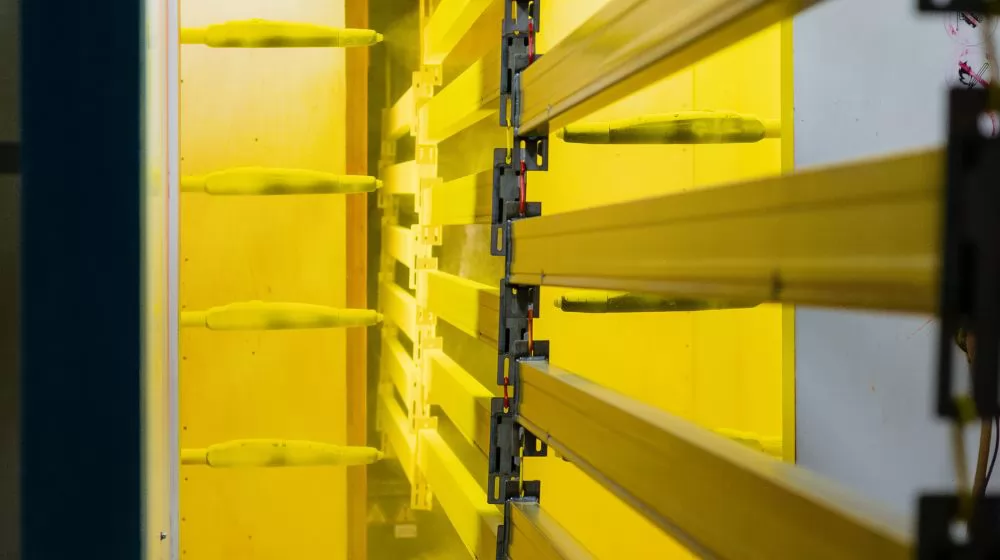
Polyester powder coating is recognized for its distinctive set of characteristics, making it a preferred choice in various industries. Understanding these key features provides insights into the advantages and applications of this coating method:
One of the standout characteristics of polyester powder coatings is their exceptional resistance to ultraviolet (UV) radiation. This makes them particularly suitable for outdoor applications where exposure to sunlight is significant. The coating maintains its color and finish, resisting fading and degradation caused by prolonged UV exposure.
Polyester coatings exhibit excellent color retention over time. The vibrant colors applied during the coating process remain intact, contributing to the longevity and aesthetic appeal of the coated surfaces. This makes polyester powder coatings ideal for applications where vibrant and consistent colors are desired.
Polyester powder coatings are known for their flexibility, allowing the coated substrate to undergo elongation and deformation without cracking. This characteristic is crucial in applications where the substrate may experience movement, expansion, or contraction, such as in architectural elements subjected to temperature variations.
The cured film of polyester coatings provides a durable and resilient surface. This durability is evident in the coating's ability to withstand mechanical stress, impacts, and environmental factors. Polyester powder coatings contribute to the long-term protection of surfaces, enhancing the overall lifespan of coated materials.
While not as chemically resistant as epoxy coatings, polyester powder coatings offer a degree of resistance to chemicals and environmental pollutants. This makes them suitable for applications where exposure to mild chemicals or pollutants is a consideration.
Polyester powder coatings can achieve a smooth and even finish on various substrates. This smoothness enhances the visual appeal of coated surfaces and contributes to a professional and aesthetically pleasing appearance. This characteristic is particularly valued in architectural and consumer goods applications.
Similar to epoxy powder coatings, the application process for polyester coatings involves electrostatic spray deposition. This method ensures uniform coverage, efficient adhesion, and a smooth finish. The ease of application contributes to cost-effectiveness and efficiency in industrial settings.
Polyester powder coatings find application in diverse industries, including architecture, automotive, furniture, and outdoor equipment. The adaptability of these coatings to different substrates, coupled with their UV resistance and color retention, makes them versatile for various manufacturing and design purposes.
Polyester powder coatings are frequently used to finish architectural elements, such as aluminum window frames, doors, and facades. The UV resistance and color retention of polyester coatings make them well-suited for exterior applications, contributing to the durability and visual appeal of buildings.
Patio furniture, playground equipment, and outdoor structures benefit from polyester powder coatings due to their resistance to UV radiation and the ability to maintain vibrant colors over time. The coatings provide protection against weathering, ensuring longevity and aesthetic appeal in outdoor settings.
Polyester powder coatings find application in the automotive sector for coating wheels, trim, and other non-metallic components. The coatings contribute to the overall aesthetics of vehicles while providing a durable and scratch-resistant finish.
Various electronic devices and appliances utilize polyester powder coatings for their metal or plastic surfaces. The coatings offer both protection and a sleek finish, enhancing the visual appeal of items such as computer casings, household appliances, and consumer electronics.
Polyester coatings are commonly applied to metal fencing, railing systems, and gates. The durability and resistance to environmental factors make them suitable for providing long-lasting protection and an attractive appearance in residential, commercial, and industrial settings.
Light fixtures and outdoor lighting often feature polyester powder coatings. The coatings not only protect against corrosion but also contribute to the aesthetics of the fixtures, ensuring they maintain their appearance in various indoor and outdoor environments.
Polyester powder coatings are used in the production of signage and displays. The ability to achieve vibrant colors, coupled with UV resistance, makes them suitable for applications where visual impact and durability are essential, such as in retail environments and outdoor advertising.
Bicycle frames, sports equipment, and recreational gear benefit from polyester powder coatings due to their durability and ability to withstand outdoor conditions. The coatings provide both protection and customization options for items in the sports and leisure industry.
Office furniture, including desks, file cabinets, and shelving, often undergo polyester powder coating. The coatings enhance the aesthetics of the furniture while providing a durable and scratch-resistant surface, well-suited for the demands of office environments.
Household appliances, such as refrigerators, washing machines, and ovens, commonly feature polyester powder coatings. The coatings not only protect against corrosion but also contribute to the overall design and visual appeal of the appliances.
The widespread application of polyester powder coating across these industries demonstrates its versatility, combining protective qualities with aesthetic benefits. Whether for architectural elements, consumer goods, or industrial equipment, polyester powder coatings play a crucial role in enhancing durability and visual appeal.
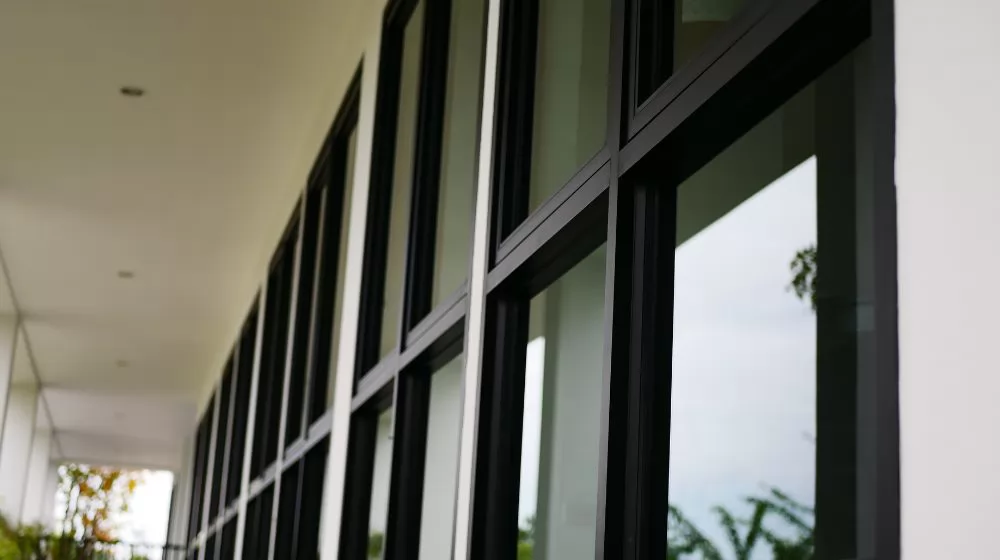
Advantages of Epoxy Powder Coating:
Exceptional Adhesion: Epoxy powder coatings exhibit strong adhesion to various substrates, ensuring a durable and long-lasting finish.
Chemical Resistance: Epoxy coatings are highly resistant to a wide range of chemicals, making them suitable for applications in corrosive environments.
Corrosion Protection: Known for providing robust corrosion protection, epoxy coatings act as a barrier against moisture and corrosive elements.
High Impact Resistance: Epoxy powder coatings offer high impact resistance, making them suitable for applications where the coated surfaces may face mechanical stress.
Versatility: Epoxy coatings can be applied to different substrates, including metals and plastics, making them versatile for various industrial applications.
Low VOC Content: Epoxy powder coatings often have lower volatile organic compound (VOC) content compared to liquid coatings, contributing to environmental and regulatory compliance.
Disadvantages of Epoxy Powder Coating:
Limited UV Resistance: Epoxy coatings may not have the same level of UV resistance as polyester coatings, making them less suitable for prolonged outdoor exposure without additional UV protection.
Brittleness: While epoxy coatings offer high impact resistance, they can be relatively brittle, especially in comparison to more flexible coatings like polyurethane.
Complex Application Process: Achieving optimal results with epoxy powder coatings can require a more complex application process, including precise control of curing temperatures.
Thicker Coating Film: Epoxy coatings can result in a thicker coating film, which may be a consideration in applications where maintaining precise dimensional tolerances is crucial.
Advantages of Polyester Powder Coating:
UV Resistance: Polyester powder coatings are highly resistant to UV radiation, making them ideal for outdoor applications where color retention is crucial.
Color Retention: These coatings maintain vibrant colors over time, contributing to the longevity and aesthetic appeal of coated surfaces.
Flexibility: Polyester coatings are flexible and can accommodate movement without cracking, making them suitable for applications where substrate flexibility is necessary.
Smooth Finish: Polyester powder coatings can achieve a smooth and even finish, enhancing the visual appeal of coated surfaces.
Wide Range of Applications: Polyester coatings are versatile and find applications in various industries, including architecture, automotive, furniture, and outdoor equipment.
Ease of Application: The electrostatic spray deposition process used for applying polyester coatings ensures uniform coverage and efficient adhesion.
Disadvantages of Polyester Powder Coating:
Limited Chemical Resistance: Polyester coatings offer limited resistance to certain chemicals, and they may not be suitable for applications with exposure to harsh chemicals.
Not Ideal for High-Temperature Environments: Polyester coatings may not perform well in applications involving sustained exposure to high temperatures, leading to potential discoloration.
Less Impact Resistance: While durable, polyester coatings may have less impact resistance compared to certain alternatives, making them less suitable for applications with extreme impact concerns.
Thicker Coating Film: Polyester coatings tend to be thicker when applied compared to some other powder coating formulations.
Understanding the advantages and disadvantages of epoxy and polyester powder coatings is crucial for selecting the most suitable option based on the specific requirements of a given application. Each type of coating has its strengths and limitations, and the choice depends on factors such as the environment, substrate, and desired properties of the finished product.
Chemical Composition:
Epoxy Coating: Epoxy powder coatings utilize thermosetting epoxy resins, which provide exceptional adhesion and chemical resistance.
Polyester Coating: Polyester powder coatings use thermosetting polyester resins, known for their UV resistance and color retention.
Performance Characteristics:
Epoxy Coating: Epoxy coatings excel in terms of adhesion, chemical resistance, and corrosion protection, making them suitable for industrial applications.
Polyester Coating: Polyester coatings are valued for their UV resistance, color retention, and flexibility, making them suitable for outdoor and architectural applications.
UV Resistance:
Epoxy Coating: Epoxy coatings have limited UV resistance and may experience color fading or degradation when exposed to prolonged sunlight.
Polyester Coating: Polyester coatings exhibit excellent UV resistance, maintaining vibrant colors and resisting fading even with extended exposure to sunlight.
Flexibility:
Epoxy Coating: Epoxy coatings can be relatively brittle and may not offer the same flexibility as polyester coatings.
Polyester Coating: Polyester coatings are more flexible, accommodating substrate movement without cracking, making them suitable for applications requiring flexibility.
Impact Resistance:
Epoxy Coating: Epoxy coatings offer high impact resistance, making them suitable for applications where the coated surfaces may face mechanical stress.
Polyester Coating: While durable, polyester coatings may have less impact resistance compared to epoxy coatings.
Chemical Resistance:
Epoxy Coating: Epoxy coatings provide robust chemical resistance, making them suitable for environments with exposure to corrosive substances.
Polyester Coating: Polyester coatings offer limited chemical resistance and may not be the best choice for applications with harsh chemical exposure.
Applications:
Epoxy Coating: Epoxy coatings are commonly used in industrial settings, such as automotive, machinery, and chemical processing, where strong adhesion and chemical resistance are essential.
Polyester Coating: Polyester coatings find applications in architectural design, outdoor furniture, automotive components, and consumer goods, where UV resistance and color retention are critical.
Curing Process:
Epoxy Coating: Epoxy coatings typically require a higher curing temperature during the application process to achieve the desired properties.
Polyester Coating: Polyester coatings generally cure at lower temperatures, contributing to their suitability for a wider range of substrates.
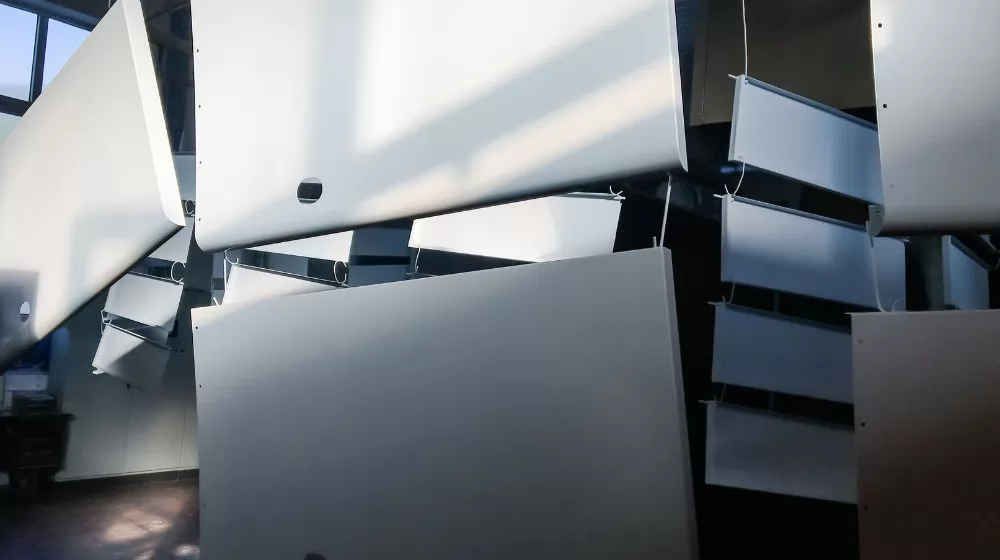
The selection between epoxy and polyester powder coating hinges on the specific demands of the application. Epoxy coatings are favored for their robust chemical resistance and adhesion, making them suitable for industrial settings with harsh conditions. On the other hand, polyester coatings excel in outdoor environments, providing outstanding UV resistance, color retention, and flexibility. Considerations such as mechanical stress, aesthetic preferences, substrate compatibility, application temperatures, and regulatory compliance guide the decision-making process. Ultimately, a thorough evaluation of these factors ensures the optimal choice for achieving the desired performance and appearance in a given coating application.
The selection between epoxy and polyester powder coating is a nuanced decision, influenced by the specific requirements of the intended application. Whether prioritizing chemical resistance, UV stability, or aesthetic appeal, each coating type offers its advantages. If you have any questions about choosing between the two, please contact Wintoly, we can answer your questions about powder coating at any time, please feel free to contact us!

 terrychen@wintoly.com
terrychen@wintoly.com
.png) 0086-757-85407388
0086-757-85407388
 6 Chaoyang Rd., National Demonstration Eco-industrialzone, Nanhai, Foshan,Guangdong,China
6 Chaoyang Rd., National Demonstration Eco-industrialzone, Nanhai, Foshan,Guangdong,China

.png)
